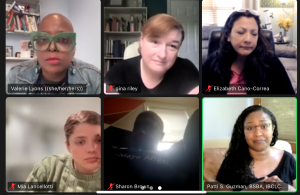As the government continues to encroach on women’s bodily autonomy, Hunter College’s School of Education held a forum last week to raise awareness on a population that is exceptionally vulnerable to these law changes: Black mothers.
Despite only making up 14% of the United States’ female population, Black women are three times as likely as white women to die during or after childbirth, and nearly twice as likely to give birth with little to no prenatal care.
Facilitating the discussion, the School of Education’s Assistant Director for Student Affairs Valerie Lyons asked a series of questions to the panelists regarding their career paths, journeys as mothers, and their meaning of “postpartum.”

The theme of all the answers were clear: this concept of “postpartum” only tells half the story. The speakers unanimously agree that Black women need to be given resources to begin planning before, during, and long after the conception and birth of their child. Patrícia Soriano Guzmán, a lactation consultant at Montefiore Nyack Hospital, sees that the language needs to be shifted towards the use of the word perinatal, which encompasses the time periods before and after childbirth.
While every mother experiences the great shift that comes along with birth giving, the healthcare system’s systemic racism creates even more barriers for Black mothers in terms of treatment and resources. “The hospital gown is the great equalizer,” said Guzmán, “yet quality of care is still allocated unfairly.” She argues that while women are strong, their entry into the medical system makes them vulnerable and susceptible to avoidable pain.
With 80% of maternity-related deaths preventable, Elizabeth Cano-Correa, a postpartum doula and lactation counselor, shared that she believed the solution was building a sense of community by connecting with other mothers. Having grown up in the United States without any maternal role models, Cano-Correa reflected on her Colombian ancestors and their traditions when it came to birth giving.
“All the female members of the family would be in the room helping the delivering mom, supporting her through the process,” said Cano-Correa. To her, that’s why midwives and doulas are so imperative: they educate, provide resources, and most importantly, fill in the gaps when family isn’t present or supportive.
Midwives are there not only during the birth, but for the weeks, months, and years after for the mothers, even attending their OB-GYN visits. Their services are covered by private insurance, medicare and medicaid.
Alongside midwives, groups like Le Leche League International provide another avenue of support for expecting mothers. Gina Riley, Program Leader of Hunter College’s Adolescent Special Education Program, shared her experience relying on Le Leche League International as a single mother. “While it was hard but beautiful, women being supportive of me and others on our journeys made the difference,” said Riley.
While all these resources are free and publicly available, finding them serves to be one of the hardest parts. With single mothers already facing so many barriers to receiving quality care, the multitude of resources can be overwhelming and hard to find when a strong support system isn’t present.
Lyons believes that’s where students come in, asking the students in the audience to share their thoughts on what makes educating themselves on these issues so important. Mia Lancelloti, a recent grad researching the generational impacts of social environments on motherhood at Columbia University, emphasized that the knowledge she’s gained has helped her pass resources down to her study’s participants in a manner they understand.
“Even though these issues may not directly affect me, having an understanding allows for solutions and implementations to become more community-based,” said Lancelloti. Another student, Frankie Moe Soughou, shared the same sentiment. “Both students & their parents need resources & support,” they said in the Zoom chat.
Raising awareness on Black mothers’ health has finally begun to become more mainstream, with the United States’s President Joe Biden naming April 11-17 “Black Maternal Health Week.” As attention on the disparity increases, Lancelloti hopes that the community and accessibility to resources are kept as the first priorities.
Guzmán, Lancelloti, Cano-Correa, and Riley hope that the audience’s main takeaway is that the power to challenge the status quo of the medical system lies in education and community.
Black maternal health resources can be found for free here.
